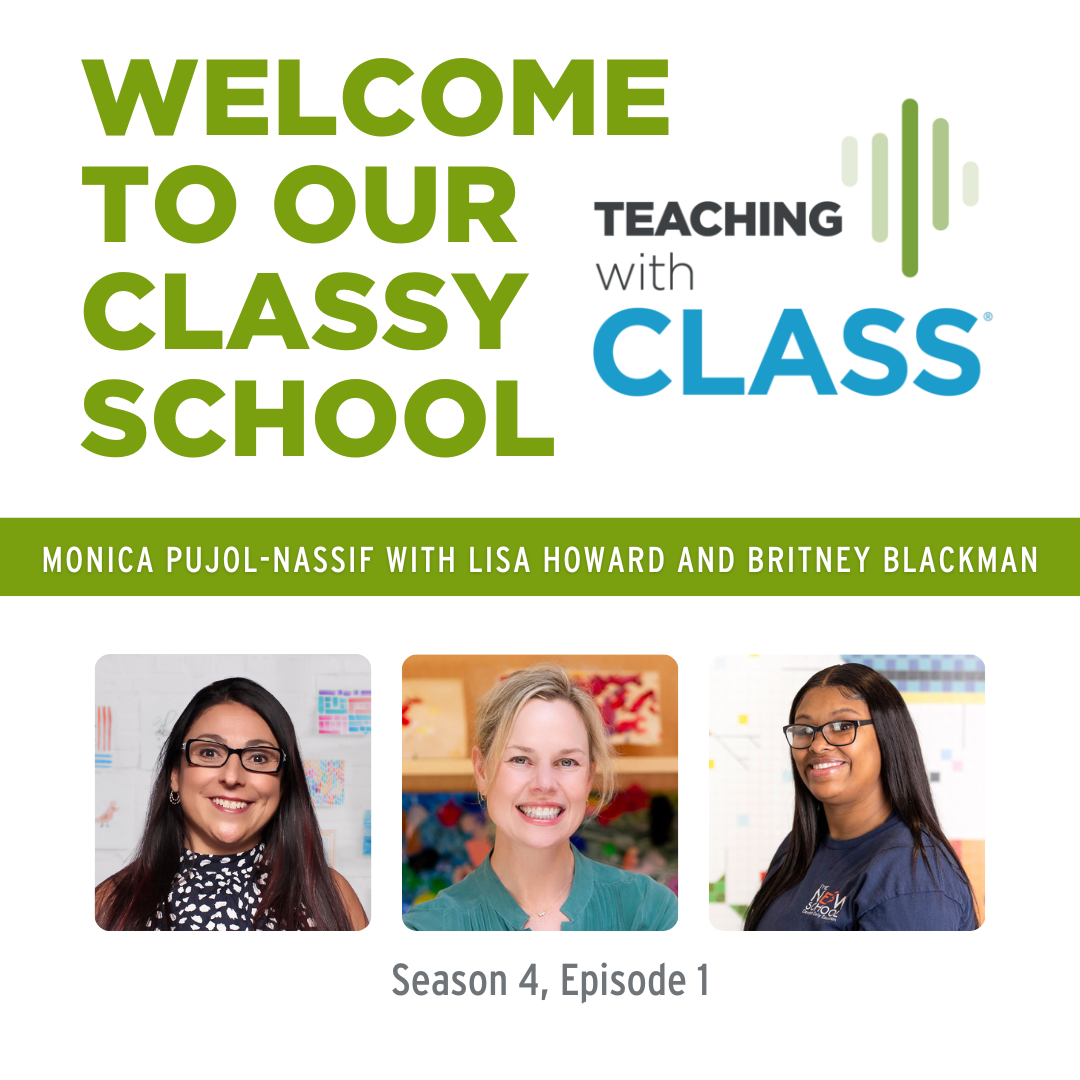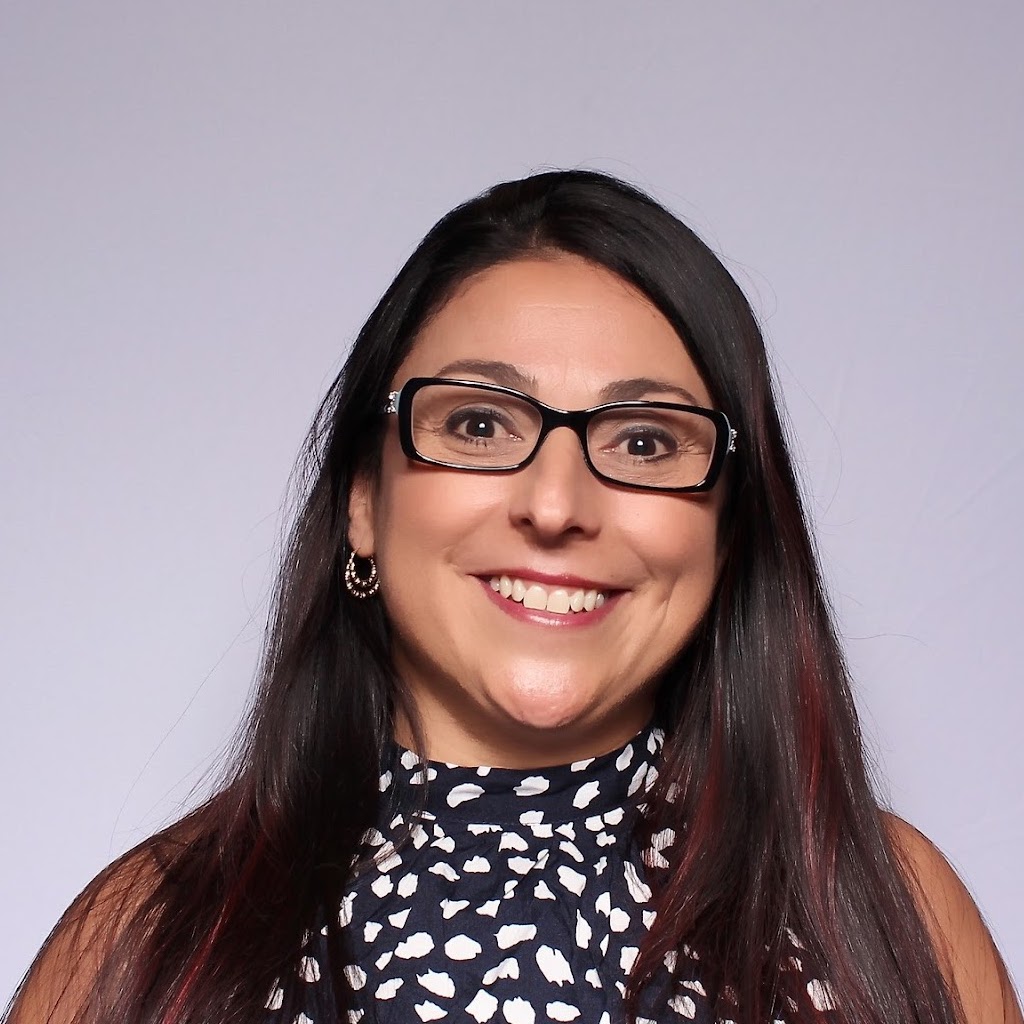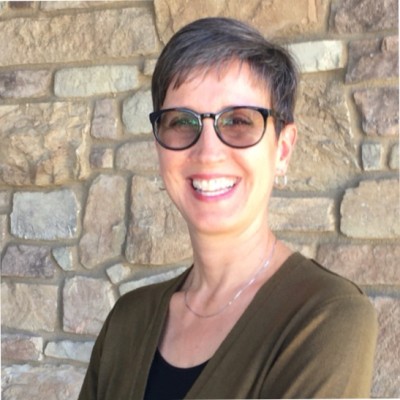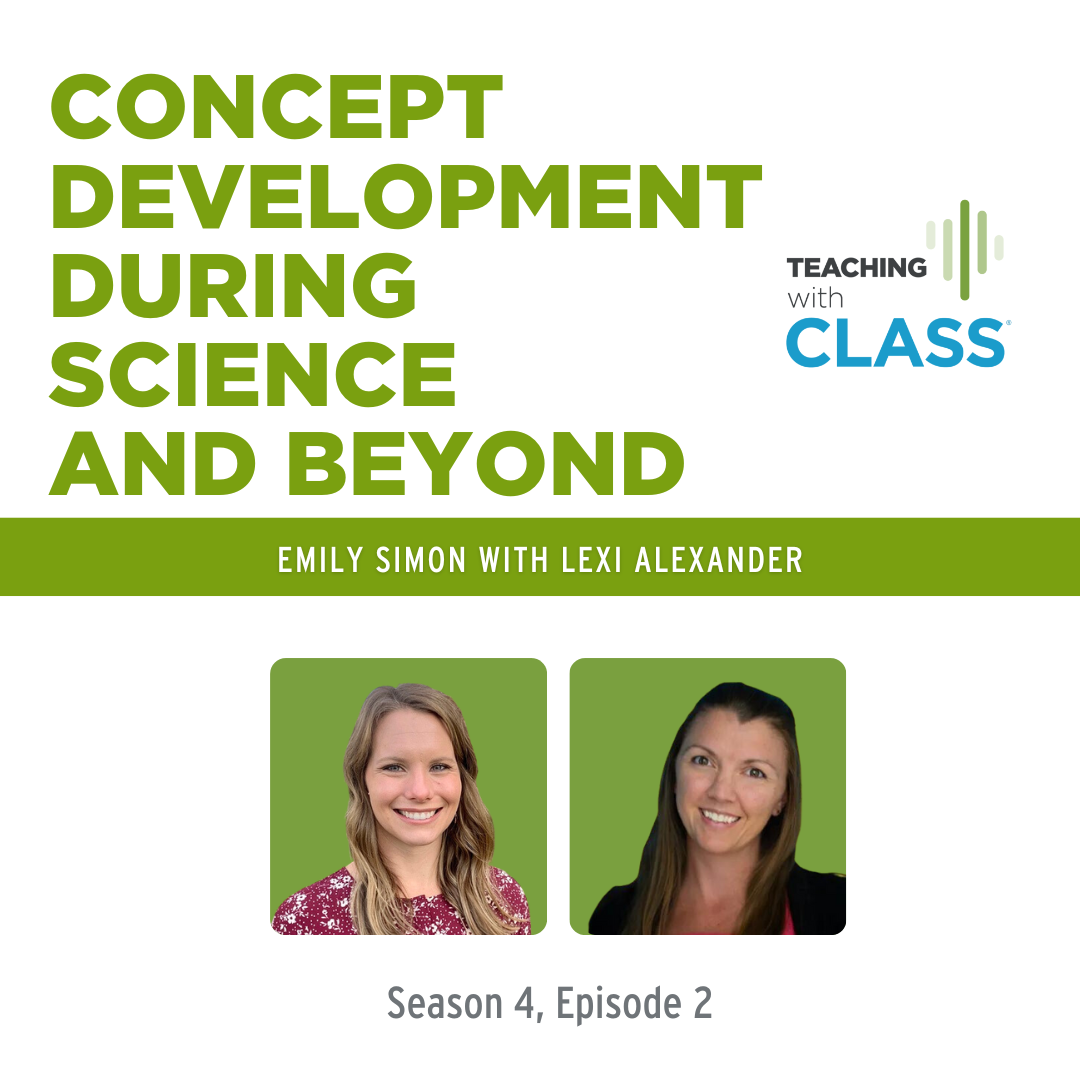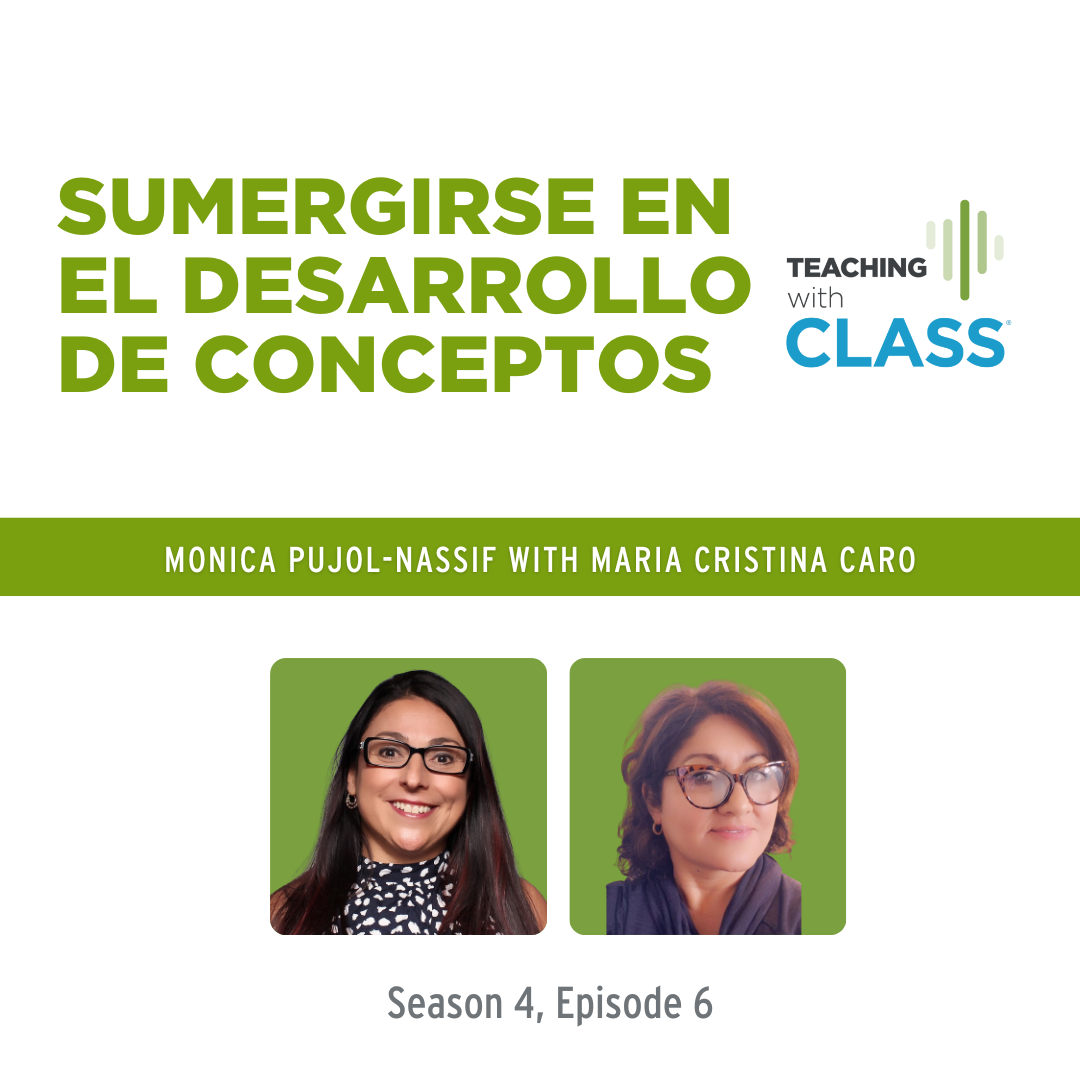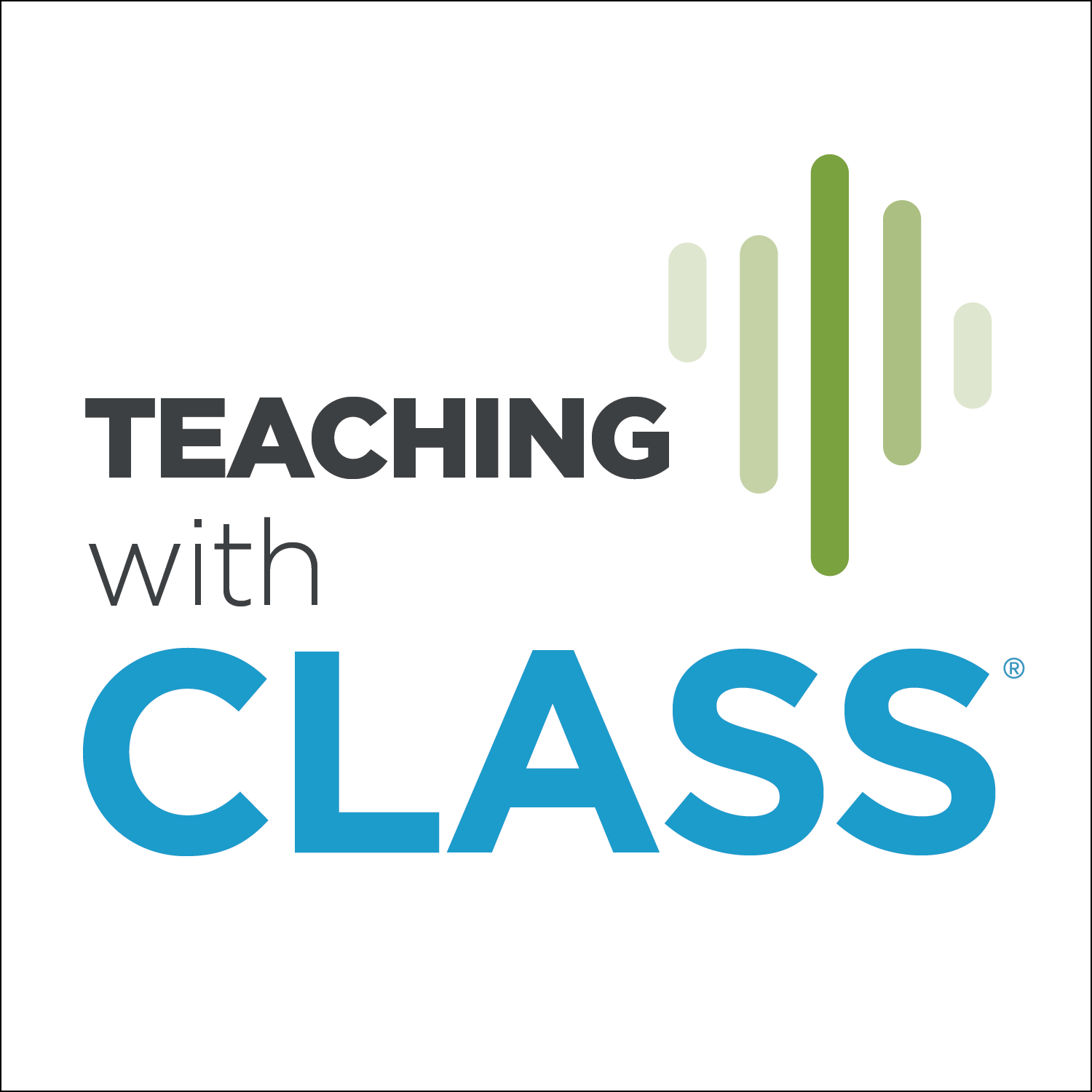Episode Transcript
Monica: Hello, everyone. Welcome to the new year of the podcast with Teachstone. I am Monica, and I will be with you in every episode, English and Spanish in this new year. I am so excited and so humbled by the opportunity to share expertise with all these people in the field, supporting teachers, supporting children, and listening and taking the strategies to bring back to our sights.
Today's episode is called Welcome to a CLASSy school. Lisa Howard and Britney Blackman are going to talk to us about their successes from their school named New E3 School located in Virginia. They're going to be talking to us about how they support the teachers in the journey of CLASS in alignment with their curriculum designed with CLASS in mind. CLASS is completely embedded in the curriculum.
They will also talk to us about, let's make friends with data. Let us use data to make decisions about how we want to improve as teachers short-term and long-view as Lisa will tell you, and how you as coaches can support your teachers, relating to them with professional development, also sitting with them, and modeling effective interactions.
Welcome, Ms. Lisa and Ms. Britney to Teachstone Podcasts dedicated to the teachers of the world trying to make a difference, with the goal to give you strategies that you can right away go and implement in your life as teachers, coaches, administrators, or leaders.
We have Ms. Lisa Howard and Ms. Britney Blackman from New E3 School in Virginia. They just happen to be in the same state where the research for CLASS occurs. Welcome to this episode. We are getting to know each other a little bit, so we have so much to talk about. But first, I want to give you space just to tell us a little bit about your role in the life of children, families, and the teachers in your current lives, please.
Lisa: I'll start. I'm Lisa Howard. I've had the distinct privilege to really work on behalf of children for probably over 25 years. In multiple roles, I've been a former public school teacher, I have been an advocate, and I have done a lot of government relations work, work with foundations, and policymakers.
Interestingly enough, E3—Elevate Early Education—is our awareness and advocacy organization in Virginia. The school actually has really been a catalyst for policy change. When we created it just about over nine years ago, we created it with the idea that everything happening inside the school could be replicated and scaled by others.
It's a state of the art building. We have people coming from all over other states and from all over Virginia to come and see who we are and what we do for children every day. We wanted to take everything we know that's good for children and bake it into one model.
We also knew that we needed to be data-driven because we ultimately wanted to prove to the policymakers in Virginia that when all children have equitable access to high quality, they will enter kindergarten ready. But we wanted to do that in a way that all of the tools that we were using in the school could also be used by other programs and like I said, be replicated and scaled.
Monica: Thank you, Ms. Lisa. That sounds super exciting. That's a good mission to have.
Lisa: It's kept me busy for quite some time now.
Monica: How about you Ms. Britney? What would you say?
Britney: I'm Britney Blackman. I'm currently the coach at The New E3 School. I've been working here at the school for about 6½ years. I started off in the classroom. It's funny because I always told Ms. Lisa, my heart was in the classroom. No matter what I did, I always wanted to be in the classroom.
Now, I'm elevated into another position. I provide professional development, coaching to all the teachers in the building. I'm just really in the moment down in classrooms with them and ongoing coaching, as well as onboarding and training some new staff and new hires.
Monica: Thank you, Ms. Britney. Thank you so much for sharing your background with us. Now we know a little bit of what you're doing. If you could share with us, how is the magic of CLASS impacting the lives of your children today, what would you say as a teacher? We want to ask a teacher. How has CLASS helped you?
Britney: I know for a fact that CLASS has helped me just become more open-minded and more in tuned to the needs, honestly of the students. Before I came to The New E3 School, I won't tell you how many years because it will reveal my age, but I've been in early education for a long time. Until I got to The New E3 School, it was this brand new curriculum that was really centered around teachers' interaction and engagement with children.
[...] with it my focus a little bit to help support children's needs and what is going to be more important than just artwork, so getting into the classroom, understanding what CLASS is. Actually, so many years using the tool has really supported my practice, as well as the curriculum that we follow.
The curriculum in CLASS really goes hand in hand. One of the perks of CLASS being right here in Virginia Teachstone, we have this curriculum that really supports everything that CLASS talks about. We have these crosswalks where we look over dimensions that we can align them with our curriculum.
One of the things I always tell teachers, let's focus on your infidelity and your learning of the model and the curriculum because CLASS really coincides with everything that the curriculum follows. That's been a big support and a big help, which CLASS then is not at the forefront, but it works alongside as a tool, and that has been very helpful.
Monica: What I hear is embedded. CLASS is embedded into the curriculum that was developed.
Britney: Yes, CLASS is embedded in the curriculum. Like Ms. Lisa was saying earlier, it's also a tool that we use to help us gauge those classroom interactions that help me focus that individualized and that co-teacher PD. What is CLASS telling me? What do observations tell me?
From that, I take that data, we cross it over into our curriculum, and we support our teachers where they are. In turn, that just helps support the student overall because it makes you more in tune with what your class is telling you. What is it revealing about your practice? What is it revealing about your classroom? And what support do you need for me?
With coaching, it's all about getting those teachers to that aha moment. I want them to get there, I don't want to give it to them. CLASS helps us support, really, that model of co-teaching, as well as them understanding integration and interactions.
Monica: Thank you, Britney. You just touched on important elements of professional development using the CLASS measure, which is strength-based. It's really becoming self-aware of what the teachers already do well and how they can do better.
It's also very reflective. You just said you don't want to give them the answers. They come up with the answers because you and Ms. Lisa, and I know that teachers in the field today are the experts in the life of children today. We have been away in that real teaching one-on-one with the children of families, but they're doing it. The fact that they can recognize that and work on it, understanding, oh, this is a tool than yours helps me, be better.
Ms. Lisa, what is that transformation period of a person who comes, who have had experience with other approaches of curriculum, and have never been exposed to CLASS, and they come to learn that you guys have this amazing curriculum developed around this tool that is focusing on interactions?
Lisa: Honestly, I think it really is dependent upon the experience that they bring to us. For that, it's different for every person and every teacher. We really try to meet them where they are and really help them to grow and develop.
A term that you'll hear us use—Britney uses this all the time—is what are your grows and glows? Really helping teachers to understand that we're going to meet you where you are, but we're going to develop you and really help you become the best teacher you can be.
A lot of that is going to be dependent upon intentional teaching practices. Really helping them to really think about, why are we doing this activity? What do we want the children to learn? What is the skill that we want the children to learn?
A lot of that really starts with building strong relationships and strong interactions with your children. That's really the starting point. But that also then carries forward with not only do we want them building strong relationships and interactions with children in the classroom, but we want that to extend with the families as well.
Britney: I think it's important, like Ms. Lisa said, that we always want our teachers to feel comfortable and understand that this model and the use of these tools are not a separate entity. It's all interwoven into how we support you. It does require a buy-in from the teachers to shift their thinking just a little bit to what a high quality, early education experience is.
What is the interaction and how can we support you? A lot of it really does require a buy-in from the teachers, and then understanding that everything that we're trying to show you when we want you to glow and grow from has a purpose.
That purpose, like Ms. Lisa said, are those strong teacher-child interactions. It's that kindergarten readiness. It's all working and woven together. We always try to meet our teachers' needs, where they are, and respect that this is going to be a different process for you. This may look different, but we'll support you the whole way through.
Monica: Thank you. We've heard how both of you work on the development of the professionalism of the teachers in this beautiful, new school. It came to mind as you were talking, have you seen the impact in the lives of children already? When the teachers are transforming their thinking, their approach, and their interactions, do you see different responses from children?
Britney: Absolutely. One of the benefits that I have from being in the classroom and coming to the school six years ago, it was a whole different new concept to me. I was introduced to CLASS from the school. Prior to coming to The New E3 School, I had never heard of it. We have teachers that start with this who have never heard of it, don't know the tool, don't know what it's for. Recognizing the intimidation that the CLASS tool brings is important and as a part of that process for our teachers.
I feel like I grew with the school and CLASS grew with the school. I've grown up in The New E3 School knowing that and actually being able to see the fruits of its labor, seeing the process of using CLASS, and how it shifted me and it turned into a shift in my interactions. I had the privilege of watching children start at one and leaving at five. It's been a beautiful thing.
Also, having the privilege of even my daughter come into the school and watching her just butterfly and blossom socially. That was my biggest concern for her. I kept her home until she was four with her grandmother just because it was Covid. She was so young, but I knew how important those social interactions were.
I knew if I could just get her somewhere that I know the teachers really support that social and emotional development, and it's right in the center of interaction, that she will be perfect and have a good experience in school and enjoy it. I had the opportunity to have her actually going here and having that experience. The buy-in I think, like Ms. Lisa was saying, is really to teach us to understand how impactful they are. I think that's where we grow.
Monica: Absolutely. I know this is collected with data, of course. Maybe Ms. Lisa can put this into words. How are those behaviors of children changing when the teachers' behaviors are also shifting? What are the three things that you say, oh my goodness, I see children doing this now because of the interactions teachers are having with them?
Lisa: It's interesting because we have a mixed income model school. We raise private dollars to be able to provide scholarships because we believe that all children deserve access to high quality early education. We provide financial aid and scholarships for middle- and low-income families to be able to have the opportunity to attend our school.
Year after year, we've been able to prove that when children have this opportunity for high quality, regardless of their zip code, then they will enter kindergarten ready in literacy, math, social skills, and self-regulation.
I can tell you story after story—I know Britney's got them—of children that started with us when they were one because their program is ages one to five. They may not have been meeting developmental milestones. Fast forward, they are now graduating, getting ready to go off to kindergarten in a month or so. They actually are meeting the literacy, the math, and the social skills and self regulation benchmarks ahead of their upper income peers.
We know that it levels the playing field. We know that it's a game changer. We've got the stories to prove that. We've got the data to show that. We've got the quantitative and the qualitative, which we know are so critically important.
What I would say to you, as a former third grade teacher a long, long time ago, I really wish I would have had a tool like this in my third grade classroom. I have always been a believer that the more you know about a teacher, or the more you know about a student or a child in your classroom, the better you can teach them. That really is no different than we should be looking at this the same way for our children, our students, and our teachers.
They are working with these children at a critical time in their development. They are educators. The more we can empower them and equip them to do what we're asking them to do in any grade level, the better they're going to be. I think that's such a missing piece in this education crisis that we're in, that we need to be giving teachers more tools across the board—from early education on up—and more support in the classroom.
We might see some of these major problems that we have right now, actually, start to dissipate because children are going to feel empowered. We're going to meet them where they are. Parents are going to understand where their children are, how they can help them, and what are some strategies they can do at home. And then teachers in the classroom are going to feel that empowerment and feel like they've got the support.
We are so fortunate to have Britney on our team. It has been an absolute delight to watch her grow over the years. That coaching component is so important. I just think you really have to have a high quality curriculum, but you need to train teachers on implementing that curriculum. You've got to have a data-driven approach and a continuous improvement approach. CLASS has just been an incredible instrument and tool for us to really make sure that every single classroom is a high quality classroom.
Monica: Thank you, Ms. Lisa. Thank you. I agree with you. I don't know Britney, but when I hear her passion, in my mind, I can almost see her going from the classroom to supporting teachers. It's a beautiful picture.
I do hear that because of your model, you're basically closing that gap of children who have less advantages in life with the children who have more advantages in life. When they get to kindergarten, they are prepared. But as we know, that's also preparing them for later in life and making their mental health stronger so they can face the challenges of their student life and then when they are citizens.
I have two questions based on what you just mentioned. One is, what will you tell a teacher who is new what CLASS is to get her excited about CLASS? The other question is, how do you involve parents? How do you transfer the information to them and invite them to practice interactions?
Britney: I think it's all in explaining the use of CLASS in your practice. It's important for us at The New E3 School to understand that it is not punitive in any way. I always tell teachers, let CLASS be second to your implementation of the curriculum and supporting yourself within that curriculum.
The beauty in our curriculum and in CLASS is that we do have these crosswalks where it is interwoven. Those dimensions and those domains that our class really align with the streaming three curriculum. I tell teachers, if you focus on that curriculum, what my observations or what my in-the-moment coaching are telling me, we'll yield the same results as what CLASS will tell me. Both instruments, we will use to individualize your growth.
That's important for teachers because they know that it's not punitive, it's not used in any way to say what you're doing right or what you're doing wrong. It tells us where we are as teachers, what our classroom needs, and then we figure out how to support it. I think it's all for the purpose of CLASS, why you're using it at your school, and what helped me all these years.
I think I resonate with the teachers more because I understand where they are now setting their shoes. When we go look over their CLASS scores, and we look in those dimensions, I can tell them, hey, that concept development was a struggle for me for about two or three years. I tell them why, I tell them what I used and the power of video, and the power of me really being intentional and wanting to support children more, how I came onto the other side of that.
Really being able to support teachers where they are in taking that tool, woven it, and really supports the teacher. I will tell new teachers, too, don't be afraid. It really is for your greater good.
Monica: Make CLASS second, too, and don't be afraid.
Britney: Don't be afraid. Make sure that you understand that CLASS is to help, not harm. CLASS is going to reveal where you need to grow, it's going to reveal your glows, and then we make a plan from there.
Lisa: I was just going to say, you've heard us say over and over again today, but really positioning it as a tool, and then reinforcing that with going in and modeling what you want to see in the classroom. Britney does so much of that. In fact, we have so many people on our team that do that every single day.
That's where I think it has to be bought in from the leadership on down because they too need to be drinking the Kool Aid. They need to be going into the classroom, modeling, and providing those interactions. It's the show and tell. It's really bringing to life in a classroom what you want to see and the experience that you want every single child to have.
Monica: Thank you. How about the second question about families? How are you really ensuring that families are part of all of this? It's not a surprise to families that their children go home and they say something new, or asking a question or problem-solve their emotions, but that they are part of the process.
Lisa: Every fall, we invite all of our families to come. We share what we call our annual report. Our annual report really is about what the data is telling us in the classroom. We look at the fall data, we look at the spring data, and we look at the Virginia Kindergarten Readiness Program preschool data. We understand where our children who are headed off to kindergarten, what their strengths were, what their weaknesses were.
We look at all that data collectively with our families. We explain that the CLASS really helps us to measure classroom quality and what's happening in the classroom. We're also very clear with them that that guides our professional development for our teachers individually. It guides our professional development for our team in each single classroom because we have a co-teaching model. And then it also guides the professional development and the coaching that's going to happen throughout the year for the entire school.
We really stress with our families that these are tools. These are instruments that we use to understand strengths and weaknesses in our classrooms, in our teachers, as well as in our children. We're not expecting that every child is going to be completely buttoned up by the time they're ready to go to kindergarten, but we do take a very data-driven approach. Not a skill and drill approach, but a data-driven approach to really understand where our children are and where we want them to go.
Ultimately, we want our children to develop a lifelong love of learning. In order for that to happen, it needs to be a fun learning environment. It needs to be engaging, it needs to be interesting, it needs to promote exploration and discovery. All of that philosophy built into what you want to see.
Over time, you're building trust and relationships, not just with the children, but with the families. I think that's really critically important. We report this information to them. We have conversations with them. We are honest about what the data is telling us.
For example, right after the pandemic, we did see a drop in social skills and self-regulation for our children. We remained open for 50% of our essential personnel. Of course, we were going to see changes in that data.
Our classrooms had changed, our teachers had changed in some instances. Some of their friends were at home, some of them were at school, transitions and routines, everything had changed for all of us. It was no surprise that the data was starting to show that.
Even this last year, the data was telling us in terms of children being ready, we saw a drop in literacy. What do you do with that information? We actually hired a literacy coach to come in and work with our teachers, work in our classrooms, and work with our children individually and in small groups.
A lot of times, people are afraid of data, especially in education because it's been a dirty word sometimes. As Britney pointed out a couple of times, it tends to be used in the wrong way. It tends to be used as school is not meeting this or teachers not doing this.
Data, really, is to help you be better. That's really what we stress with our families and we stress with our teachers. I think if you have a culture of continuous improvement, the parents understand that, and the teachers understand that, then we're all committed to getting to a better place. That's critically important.
Monica: Thank you, Ms. Lisa. Britney, I think you were going to add something.
Britney: I think it's just really important also to understand teachers. Like Ms. Lisa was saying, during Covid, it was a scary time. Teachers were scared, children were scared. Every day, something was changing. We were open, we were operating, but we did see a decline. We saw a shift in our practice.
Most importantly, I think prior to us testing twice, we only used to test once in the fall and recognizing that, hey, we need more data. We need data to be able to say, in the fall, we were here, our teachers were working towards this. But now, in the spring, we've seen it, and this is where we need to go. It continues to support that continuous improvement.
I just think it's important for teachers to know that this is not something that they're going to hit the nail on the head. I think sometimes that's where we go as teachers. We want to be perfect, and we want to get the best scores.
I can tell you, I was always one of those teachers, but I am doing this, Ms. Tara, that was my previous coach. I am doing this, and I'm not understanding really diving into what the scores are telling me and not paying attention to the number. I think that it's most important for teachers that I can leave teachers with anything. Look at what the data is revealing about you, and look away from the numbers. What is it saying about who you are as a teacher? And how could you be more impactful, if anything?
Monica: Thank you, Britney. I've heard so much about the culture that you have in everything that you're doing, that you're building. I'm going to start with the last point that you made. It doesn't have to be perfect for the teachers or for the school. It's just effective. It's just that you're working in that environment.
I want to summarize. I have four key takeaways, but please feel free to add anything that you want to this. I heard from the beginning that buy-in is one of the most important elements to be successful from leadership to every level of this relationship/partnership. Teachers need to love it. The administration, the coaches, the families, need to also understand it and start implementing themselves.
For the coaches, what I heard is to model what you want to see in the classroom. Coaches, that is your amazing mission. Getting into the classroom, being with the children, modeling, effective interaction so that teachers can see, oh, this can be done. I’m a real person, you. I heard [...].
For involving families, I heard building those relationships and sharing the data. I'm going to go back to that data when I was talking about that buy-in. I agree with Ms. Lisa, people are scared of that word for some reason. Some people feel that they don't understand it and they block it out. But really, it's just information that is helping us make decisions—short-term decisions, long-term decisions—to have that continued improvement within your sides.
For years, teachers, thank you for the work that you do every day with those children. The message is don't be afraid. Grow as a team, make CLASS [...] to what you do. Make it fun, promote exploration and discovery. We're not looking for perfection, but effectiveness. Anything that you ladies want to add that you know is so important, that you want people to hear before we close?
Lisa: I would just say, take the long view. Use the data over time, and really understand where you are and where you want to go. Don't be afraid to do that because you're going to be amazed at the growth.
For example, in the early days, when we started doing that report, we compared ourselves to some of the top early education programs that had been around much longer than we had. We were always neck and neck in terms of all the domains in CLASS or exceeding.
That's been a really good tool for us to compare ourselves nationally with other programs to see where we are, but then also see areas in which we can improve along the way. So don't be afraid. It really is about taking the long view, and it is a journey. It's a journey for each teacher. It's a journey for each school, it's a journey for each coach. CLASS is just an incredible tool to help you get there.
Monica: Thank you, Ms. Lisa, that's a beautiful comment.
Britney: I guess I would tell all the teachers out there that there is no perfect teacher, to give yourself some grace and a space to grow.
Monica: That's beautiful, Ms. Britney. Definitely, give yourself space. With this, we get to the end of our episode for today. I want to thank you from the bottom of my heart, Lisa and Britney, for coming and sharing your experience in this amazing journey.
That is pretty [...] you said years, but it's so powerful and so humble. Being so humble, comparing yourselves, wanting to improve, using that data, and taking the steps to improve, is taking them really far. I can only imagine the life of those children and the things that they're going to be able to do in their lives. Thank you again, and we'll see you in the next episode, everybody. Have a good rest of the day.
Lisa: Thank you.
Monica: Thank you everyone for listening, for tuning in. We really hope that you take those key takeaways with you. Teachstone is always here for you. You can always reach out to us in that learning community. Go ahead and spread love and wisdom to the children of the world.
